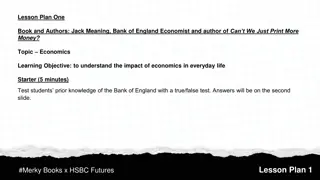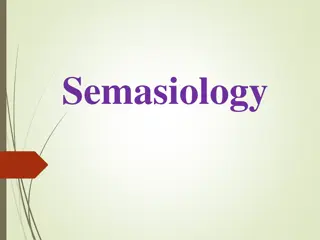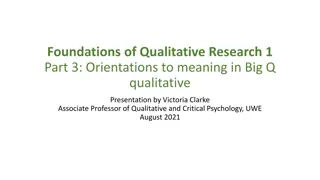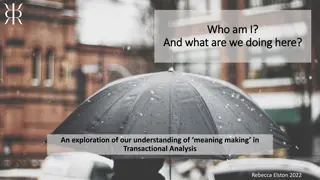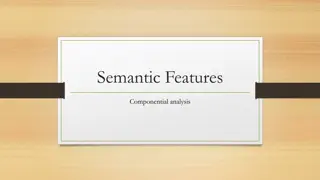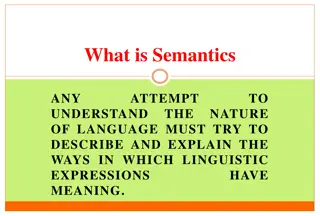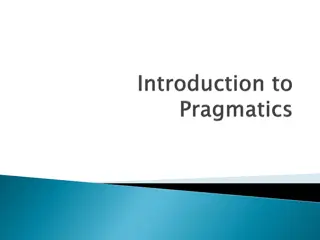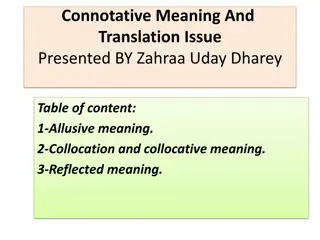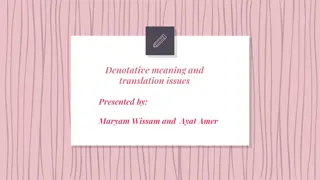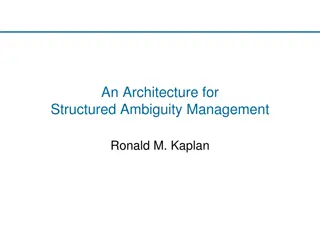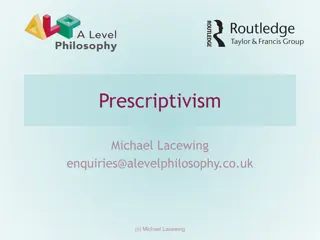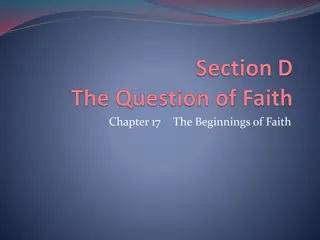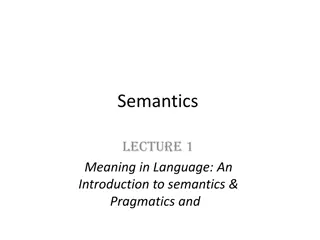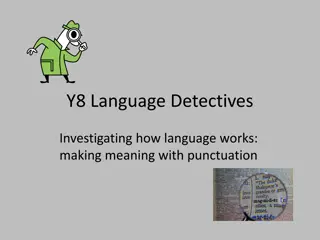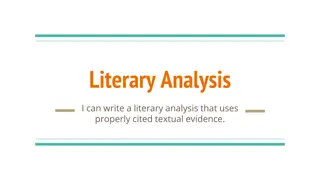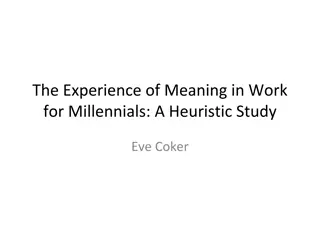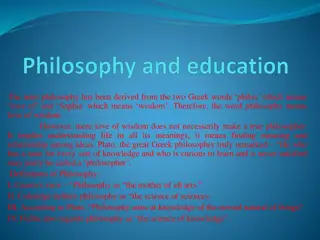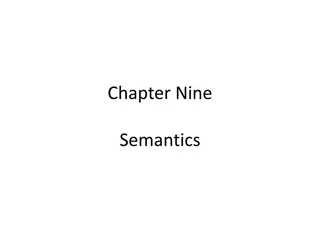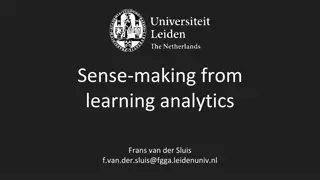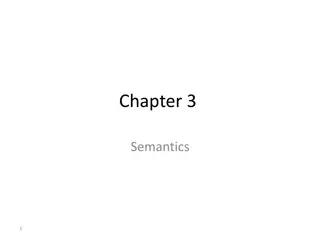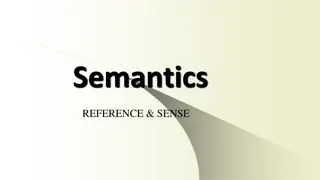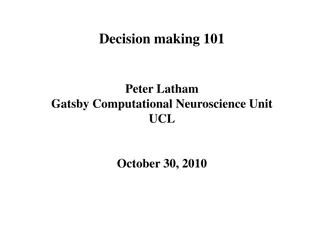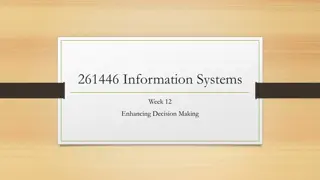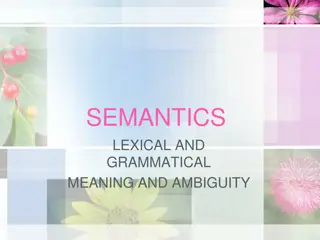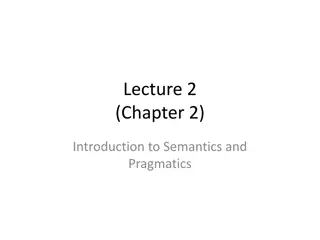Understanding Vulnerability: Meaning, Types, and Factors affecting Vulnerability
This article explores the concept of vulnerability, including its meaning, types (physical and social), and factors that contribute to vulnerability. It discusses the impact of hazardous events on communities, infrastructure, and the environment, and highlights the importance of awareness and prepar
26 views • 31 slides
Understanding Non-literal Meaning: Idioms, Metaphors, and Metonymy
The unpredictable world of non-literal meaning through idiomatic expressions, metaphors, and metonymy. Discover how these concepts shape language and thought.
3 views • 37 slides
Exploring the Two Dimensions of Meaning: Similarity and Contiguity in Language and Literature
This content delves into the dimensions of meaning, focusing on similarity and contiguity, as explored in language and literature. It discusses the significance of Saussure's paradigm and syntagm, Jakobson's theories on similarity and contiguity in discourse, and the impact of brain damage on langua
0 views • 66 slides
Exploring Economics in Everyday Life with Jack Meaning
Engage students in understanding the impact of economics through activities centered around the book "Can't We Just Print More Money?" by Jack Meaning. From discussing sandwiches as an analogy for economic concepts to exploring career paths and financial literacy, this lesson plan aims to enhance st
0 views • 18 slides
Understanding Semasiology: The Study of Word Meaning
Semasiology is a branch of linguistics focused on the meaning of words. It delves into various aspects of lexical meaning, semantic development, polysemy, and semantic structure. Through exploring types of word meanings and semantic changes, semasiology helps us comprehend the intricate nuances of l
4 views • 19 slides
Understanding Translation: Key Concepts and Definitions
Translation involves transferring written text from one language to another, while interpreting deals with oral communication. Etymologically, the term "translation" comes from Latin meaning "to carry over." It is a process of replacing an original text with another in a different language. Translat
11 views • 76 slides
Understanding Brain Development and Decision-Making Skills
Explore the fascinating realm of brain development and decision-making skills, focusing on how different brain regions activate during decision-making, the evolution of decision-making abilities from adolescence to adulthood, the importance of practicing decision-making skills, and the influence of
6 views • 10 slides
Analyzing Gender-Based Double Standard in Taylor Swift's "The Man
Analyzing Taylor Swift's song "The Man" through a semantic approach, exploring the meaning using Leech's seven types of meaning theory. The study connects the lyrics and music video to real-life experiences, focusing on gender-based double standards prevalent in society.
3 views • 12 slides
Understanding Semasiology: The Study of Meaning in Language
Semasiology, a branch of lexicology, focuses on the study of meaning in language through different approaches such as the referent approach and functional approach. The referent approach links the sound form with the concept denoted by the word, while the functional approach emphasizes the relations
2 views • 15 slides
Understanding Qualitative Research: Foundations and Orientations
Explore the foundations of qualitative research and orientations to meaning in Big Q qualitative methods. Delve into the values, characteristics, and theoretical underpinnings of qualitative inquiry, and reflect on the significance of meaning-making in research. Consider the role of subjectivity in
0 views • 23 slides
Making Informed Decisions in Environmental Science
Values play a crucial role in environmental decision-making. Scientific research is essential in addressing environmental issues, but understanding values is necessary before research can begin. This article discusses how values impact environmental decision-making and introduces an environmental de
0 views • 22 slides
Enhancing Career Decision Making Process
Explore the importance of good decision-making, types of decision makers, problems faced in decision making, readiness factors for career decisions, decision-making processes, and the CASVE cycle. Understand the significance of effective decision-making skills and how they impact our lives.
0 views • 26 slides
Exploring Meaning-Making in Transactional Analysis
An exploration of understanding meaning-making in Transactional Analysis by Rebecca Elston in 2022. The discussion revolves around traditional TA concepts, individual connections to place, broadening work frames, and applying Eco TA principles. Key topics include scripts, beliefs about self and othe
0 views • 19 slides
Understanding Semantic Features in Language Study
Studying basic conceptual meaning is crucial in language analysis to explain the oddness in sentences like "The hamburger ate the boy." Semantic roles and thematic roles help identify the roles of entities in a sentence, such as agents and themes. By analyzing the components of conceptual meaning, w
1 views • 12 slides
Understanding Semantics: The Study of Meaning in Linguistics
Semantics is the scientific study of meaning in language, delving into questions about definitions, ideas, objects, relations between meanings, and how meanings interact with syntactic rules. Exploring the vagueness of the term "meaning," semanticists explore sense, reference, denotation, and connot
2 views • 19 slides
An Exploration of Linguistic Meaning: Semantics and Pragmatics
Delve into the realm of linguistic meaning through the lenses of semantics and pragmatics. Explore how words and phrases carry literal meanings, while language usage in social contexts creates both literal and nonliteral meanings. Uncover the intricate interplay between semantics, concerned with the
6 views • 70 slides
Comprehensive Guide to Decision Making and Creative Thinking in Management
Explore the rational model of decision-making, ways individuals and groups make compromises, guidelines for effective decision-making and creative thinking, utilizing probability theory and decision trees, advantages of group decision-making, and strategies to overcome creativity barriers. Understan
0 views • 30 slides
Exploring Connotative Meaning and Translation Issues in Language
Delve into the nuances of connotative meaning through allusive, collocation, and reflected meanings. Discover how translation challenges arise due to cultural nuances and connotations, as exemplified by various expressions and word associations. Explore the significance of appropriate collocations i
0 views • 16 slides
Meaning and Meaning-making in Big Q Qualitative Research
Qualitative research explores different understandings of meaning and meaning-making, providing researchers with tools, techniques, and values. Big Q qualitative research focuses on the active role of words in creating meaning beyond reflecting experiences. This lecture series delves into the founda
1 views • 20 slides
Understanding Denotative Meaning and Translation Issues
Denotative meaning in translation poses challenges due to the elastic and indeterminate nature of meaning, especially in dealing with the cognitive or literal sense of words. Polysemy, homonymy, and synonymy contribute to complexities in determining precise denotative meanings. The rigidity and flex
0 views • 40 slides
Managing Ambiguity in Language: An Innovative Approach
Language presents challenges due to its inherent ambiguity, making it difficult to map between form and meaning. This content discusses an architecture for structured ambiguity management, emphasizing the complexities of linguistic interpretation, modular mapping from text to meaning, and the pervas
0 views • 31 slides
Understanding Adult Learning and Development
Explore the concept of adult learning and personal development through informal and formal contexts. Dive into the significance of meaning-making and experiential learning in shaping our existence. Understand the evolving complexity of meaning-making systems in the journey of adult development.
1 views • 20 slides
Guide to Making a Submission on the Climate Change Bill 2022
Public involvement in law-making is vital, and making a submission on the Climate Change Bill 2022 allows you to express your views, concerns, and suggested changes in a carefully considered manner. Your submission, presented in a suitable format and tone, can influence decision-making. Follow the p
0 views • 12 slides
Exploring Moral Judgments and Prescriptive Meaning in Ethics
This content delves into non-cognitivism, Hare’s prescriptivism, and moral anti-realism to understand what we do when making moral judgments. It discusses prescriptive meaning, the concept of good, and how moral language guides actions. The objections raised regarding moral language's functions, p
0 views • 9 slides
Should Assisted Suicide be Legalized in China? Decision-making with Six Thinking Hats
The content discusses the decision-making process using the Six Thinking Hats method to determine whether assisted suicide should be legalized in China. Various tools and sessions are highlighted, guiding participants through considering different viewpoints, analyzing arguments, and making an infor
0 views • 12 slides
Exploring the Meaning of Life and Purpose Through Faith and Reflection
Humans are inherently curious, constantly seeking answers to questions about life's meaning and purpose. The journey involves questioning, searching for meaning in various aspects of life, exploring religious beliefs, and engaging in reflective practices.
0 views • 10 slides
Introduction to Meaning in Language: Semantics & Pragmatics
Meaning in language is explored in this introductory lecture, covering aspects such as communication, semiotics, linguistic channels, and approaches to studying meaning. The process of encoding messages, signal transmission, noise interference, and decoding are discussed within the context of commun
0 views • 19 slides
Understanding the Role of Punctuation in Making Meaning
Explore the significance of punctuation in language through various examples and explanations. Discover how punctuation affects the meaning of sentences, from creating jokes to clarifying intentions. Learn when to use commas appropriately and how they impact sentence structure. Dive into the world o
0 views • 13 slides
Implementing Group Decision-Making Tools with Voting Procedures at Toulouse E-Democracy Summer School
Decision-making in organizations is crucial, and group decision-making can lead to conflicts due to differing views. Group Decision Support Systems (GDSS) are essential for facilitating decision-making processes. The Toulouse E-Democracy Summer School discusses the implementation of voting tools in
0 views • 21 slides
Dive into Literary Analysis: Understanding the Depths of Textual Meaning
Literary analysis involves dissecting literature to uncover the significance of its parts and how they contribute to the overall meaning. By examining rhetoric and story elements, and exploring the significance and meaning behind the text, readers can gain a deeper understanding of the author's mess
0 views • 10 slides
Understanding Meaning in Work for Millennials: A Heuristic Study
This study explores the experience of meaning in work for millennials, considering its impact on organizational commitment, change, vision-championing, and leadership. It aims to contribute to the existing knowledge base by examining how millennials perceive and create meaning in their work, using q
0 views • 14 slides
Understanding Philosophy: The Search for Wisdom and Truth
The term "philosophy" originates from Greek words meaning "love of wisdom." True philosophy involves seeking meaning and connections among ideas, transcending mere curiosity. Various definitions emphasize philosophy as the foundation of all arts, the science of sciences, and the pursuit of eternal k
0 views • 6 slides
Exploring Semantics: Meaning of Words and Concepts
Semantics is the study of the meaning of words, ranging from their basic literal components to their associative connotations. This branch of linguistics focuses on objective meaning shared by all rather than subjective interpretations. Concepts like conceptual and associative meanings are explained
0 views • 22 slides
Sense-making from Learning Analytics: Exploring Challenges and Opportunities
This collection of images delves into the realm of learning analytics, emphasizing the complexities of sense-making and the challenges faced. It discusses the interpretation of granular behavioral measures, the role of proxies in understanding behavior, and the importance of selecting well-supported
0 views • 10 slides
Understanding Semantics: Exploring Types and Dimensions of Meaning
Explore the complexities of semantics by delving into the types and dimensions of meaning. From descriptive to non-descriptive meaning, learn how the normality profile of linguistic items contributes to their overall meaning. Distinguish between semantic and grammatical anomalies and discover the nu
0 views • 32 slides
Understanding Semantics: Meaning, Reference, and Sense
Explore the intricate world of semantics through an analysis of meaning, reference, denotation, connotation, and the classification of meaning by G. Leech. Delve into the concepts of conceptual and associative meanings, and understand the importance of sense in expressions. Learn how connotations pl
0 views • 32 slides
Challenges in Decision Making: Understanding the Complexity of Making Good Choices
Making good decisions involves maximizing future rewards while dealing with uncertainty, numerous potential outcomes, and high stakes. Reinforcement learning offers algorithms to guide decision-making processes. The difficulty lies in estimating future rewards, facing uncertainty, navigating through
0 views • 80 slides
Enhancing Decision Making with Information Systems
Explore the role of information systems in enhancing decision-making processes within organizations. Topics include business intelligence, types of decisions, decision-making processes, and managerial roles. Learn about structured, unstructured, and semi-structured decisions, different models of man
0 views • 21 slides
Understanding Semantics, Lexical, and Grammatical Meaning
Exploring the nuances of semantics, lexical meaning, and grammatical meaning, this content delves into the distinctions between them, the role of lexemes, and the complexities associated with words. It discusses the various kinds of meanings expressed at the lexical and grammatical levels, including
1 views • 37 slides
Introduction to Semantics and Pragmatics: Understanding Meaning in Language
This lecture delves into the fundamental concepts of semantics and pragmatics, exploring the distinction between extension and intension in language meaning. It discusses the relationships between words, the world, and other linguistic elements, emphasizing the importance of sense, denotation, and r
0 views • 13 slides



